New Delhi – The Modi Wang Yi Meeting held on Tuesday marked a significant milestone in India-China diplomatic relations, with Prime Minister Narendra Modi highlighting “steady progress” in bilateral ties following extensive discussions with Chinese Foreign Minister Wang Yi. This high-level engagement demonstrates the continuing momentum in normalizing relations between the two Asian giants after years of border tensions and diplomatic strain.
During the Modi Wang Yi Meeting, Prime Minister Modi emphasized that India-China relations have advanced considerably since his previous encounter with President Xi Jinping in Kazan last year. The Prime Minister’s assessment reflects growing optimism about the trajectory of bilateral cooperation and mutual understanding between the world’s two most populous nations.
Foundation of Mutual Respect and Understanding
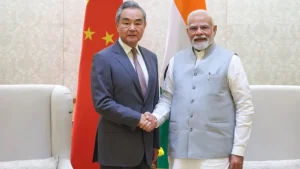
The Modi Wang Yi Meeting was characterized by Prime Minister Modi’s emphasis on the foundational principles guiding improved bilateral relations. “Since my meeting with President Xi in Kazan last year, India-China relations have made steady progress guided by respect for each other’s interests and sensitivities,” Modi stated following the diplomatic engagement.
This approach highlighted during the Modi Wang Yi Meeting represents a mature diplomatic framework that acknowledges both nations’ legitimate concerns while prioritizing constructive engagement over confrontational approaches. The emphasis on mutual respect indicates both sides’ commitment to sustainable relationship improvement.
SCO Summit Invitation and Future Engagement
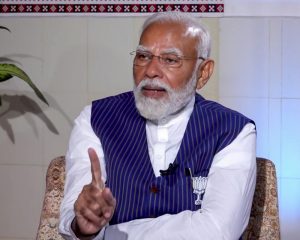

A crucial outcome of the Modi Wang Yi Meeting was Wang Yi’s delivery of a formal message and invitation from President Xi Jinping for the upcoming Shanghai Cooperation Organisation Summit. This invitation sets the stage for Modi’s anticipated visit to China on August 31, marking his first trip to China since 2018.
The Modi Wang Yi Meeting established clear expectations for the upcoming SCO Summit in Tianjin, where Modi and Xi Jinping are scheduled to meet on the sidelines. This forthcoming encounter represents the continuation of dialogue initiated during their previous meeting in Kazan and reinforced through the current Modi Wang Yi Meeting.
Regional and Global Peace Implications
Prime Minister Modi’s vision articulated during the Modi Wang Yi Meeting extended beyond bilateral concerns to encompass regional and global stability. “Stable, predictable, constructive ties between India and China will contribute significantly to regional as well as global peace and prosperity,” Modi emphasized, highlighting the international significance of improved India-China relations.
The Modi Wang Yi Meeting underscored how normalized relations between these nuclear-powered neighbors could positively impact broader Asian stability and global economic cooperation. This perspective reflects recognition of both nations’ responsibilities as major powers in shaping international order.
Comprehensive Diplomatic Engagement Framework
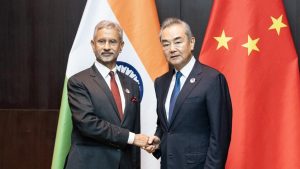

The Modi Wang Yi Meeting formed part of a broader diplomatic engagement framework involving multiple high-level interactions during Wang Yi’s Delhi visit. Prior to meeting Prime Minister Modi, the Chinese Foreign Minister engaged with National Security Advisor Ajit Doval and External Affairs Minister S. Jaishankar, ensuring comprehensive coverage of bilateral issues.
During his meeting with NSA Doval preceding the Modi Wang Yi Meeting, critical issues related to de-escalation, delimitation, and boundary affairs received detailed attention. These discussions complemented the broader diplomatic themes addressed during the Modi Wang Yi Meeting while focusing specifically on border management and conflict resolution mechanisms.
Border Peace and Tranquility Emphasis
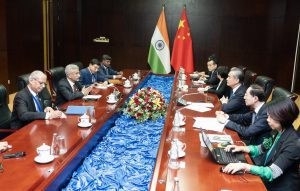

A central theme of the Modi Wang Yi Meeting involved Prime Minister Modi’s emphasis on maintaining peace and tranquility along the disputed border areas. Modi reiterated India’s commitment to achieving “a fair, reasonable and mutually acceptable resolution of the boundary question,” demonstrating continued prioritization of peaceful conflict resolution.
The Modi Wang Yi Meeting reaffirmed both sides’ understanding that sustainable diplomatic progress requires effective border management and continued de-escalation efforts. This focus reflects lessons learned from previous border tensions and the importance of preventing future conflicts through proactive diplomatic engagement.
Counter-Terrorism Cooperation Framework
Discussions during the Modi Wang Yi Meeting extended to security cooperation, particularly regarding terrorism challenges. The Indian side raised concerns about terrorism in all its forms and manifestations, including cross-border terrorism, during Wang Yi’s broader Delhi engagement preceding the Modi Wang Yi Meeting.
Significantly, Minister Wang Yi acknowledged the importance of counter-terrorism cooperation, with official statements confirming that he “concurred that countering terrorism should be given the highest priority.” This alignment on security issues provides additional foundation for the diplomatic progress celebrated during the Modi Wang Yi Meeting.
Strategic Timeline and Historical Context
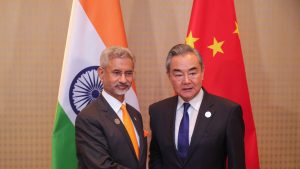

The Modi Wang Yi Meeting occurs within a crucial diplomatic timeline, following the October 2024 Kazan meeting between Modi and Xi Jinping where both leaders agreed to normalize ties after a four-year military standoff at the Line of Actual Control. Wang Yi’s visit represents the first ministerial-level engagement since that historic Kazan summit.
This diplomatic sequence culminating in the Modi Wang Yi Meeting demonstrates systematic relationship restoration through multiple channels and levels of engagement. The progression from leader-level agreement in Kazan to current ministerial implementation reflects structured approach to bilateral normalization.
Bilateral Cooperation Areas and Future Prospects
The discussions surrounding the Modi Wang Yi Meeting addressed various bilateral, regional, and international issues of common interest, indicating the comprehensive scope of improving India-China cooperation. These conversations covered trade relations, regional security, multilateral engagement, and various practical cooperation mechanisms.
The Modi Wang Yi Meeting also built upon previous diplomatic successes, including the June 2025 resumption of the Kailash Mansarovar Yatra for Indian pilgrims and India’s renewed issuance of tourist visas for Chinese visitors. Both sides continue discussing resumption of river water data sharing and direct flight restoration suspended since 2020.

